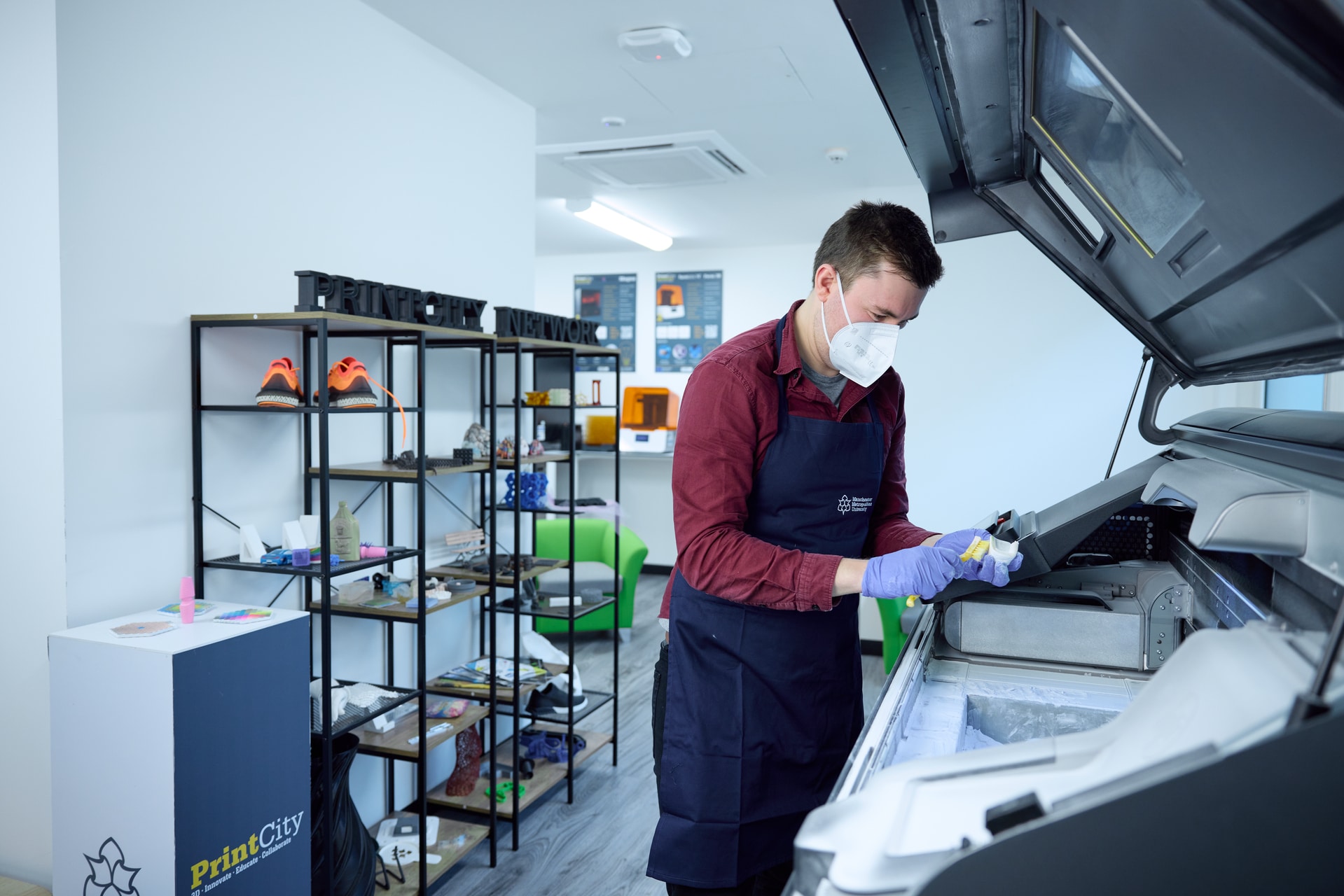What do you do if you work in product design, mechanical engineering, fashion and textiles, animation, business and architecture and you want to expand your knowledge and specialise in one of the most revolutionary technologies to emerge in the past decade? If you’re Callum Baxter, you join the MSc in Digital Design and Manufacturing at Manchester Metropolitan University.
A technician working to support the education of Sixth Form students in product design, he often uses 3D printers, laser cutters and CNC routers to help students manufacture prototypes of their designs. Baxter decided to join the MSc after a visit to PrintCity last year. “I was impressed by the resources available to students, the successes of the alumni, and the knowledge of the technical and academic staff within the facility,” he says.
PrintCity is a state-of-the-art facility that would later become his academic home. “Access to the advanced additive manufacturing and post-processing technologies at PrintCity has given me a better understanding of the capabilities of the additive manufacturing industry. It has also provided me with the opportunity to network with students from a diverse range of backgrounds, including project management, fashion studies, and product design,” Baxter says.
He’s seen the positive impact these technologies can have on student’s work, and excited to follow the progress of his peers in applying their additive manufacturing skills as they graduate into the professional world. “It’s exciting to think about the different design opportunities that can be leveraged from additive manufacturing and how it can develop new and innovative products for a range of markets,” Baxter says.
Recognised as one of the top modern universities for research quality, Manchester Metropolitan University aims to enrich its students’ lives, raise the impact of their excellent education and research, and project its application to Manchester and the world.
One way it does that is through the MSc in Digital Design and Manufacturing programme. By pursuing this programme, you will develop skills in computer-aided design, modelling and industrial sustainability. This comes with exposure to all aspects of 3D printing and Industry 4.0 while exploring The Internet of Things, generative design and even augmented and virtual reality. With major manufacturers and healthcare organisations heavily investing in 3D print technology, this qualification places you at the forefront of several rapidly growing industries.
Baxter’s coursemate recently secured a job with the Aston Martin F1 team, following the footsteps of another graduate who joined the illustrious company last October. Another F1 scholarship student spent his summer internship with the team.

PrintCity is home to manufacturing experts, designers, engineers and students on MSc Digital Design and Manufacturing programme. Source: Manchester Metropolitan University
The best part? With over 70 3D printers, you can gain invaluable exposure to a wide spectrum of 3D printing possibilities. These printers include Stereolithography, Continuous Fibre Fabrication, Fused Filament Fabrication, and the Metal X printer, among others.
However, it’s not just about the number of printers this centre has; it’s the hands-on experiences that set this centre apart. Industrial engagement is a core component of the MSc, and PrintCity provides many opportunities to engage with practitioners. For example, you get to take part in the process of creating products, models, and prototypes that cater to the diverse needs of various industries. “During the programme, we visited Heineken’s brewery in Manchester to learn how consumer goods companies are using additive manufacturing technologies, Autodesk’s advanced manufacturing centre to learn about sophisticated manufacturing workflows, and attended TCT 360, the UK’s biggest Additive Manufacturing conference,” Baxter says.
These experiences have been integral to Baxter’s professional development. During his summer internship at the brewery, he drew upon them to perform his assigned tasks.
Carl Diver, a Professor of Innovative Manufacturing and the Director of PrintCity, believes PrintCity is the perfect place for students to work on live projects and interact with businesses.
“Students can access PrintCity from day one,” Diver says. “The students have their room within the facility with printers and scanners solely for their use. More industrial equipment can be accessed through dissertation projects. PrintCity also supports companies with research and innovation projects, providing students with an opportunity to interact with those businesses on-site and see the kind of projects that are running.”

At PrintCity, you get to understand the full workflow from design through to manufacturing and post-processing and how we can be more sustainable around production. Source: Manchester Metropolitan University
PrintCity researchers and academics are at the forefront of this field. They attend conferences, publish research papers, and engage with the industry to find practical 3D printing solutions. Last year, the university’s 3D printing team was crowned the “3D Printing Industry Award for Research/Academic Team of the Year.” Their agility in keeping up with the latest trends ensures students have access to cutting-edge insights.
What further makes PrintCity unique is that it’s not just a place for engineers but also artists, sculptors, product designers, medical and dental technologists, animators, architects, fashion designers, graphic and three-dimensional designers. BA (Hons) Fashion Design and Technology Natalija Siukstiene found the freedom and independence to create and make designs that were previously impossible here.
“After winning first prize for my garment at a Prototype Exhibition in the first term, I felt confident enough to pursue 3D printing innovation,” says Siukstiene. “I learned to create 3D printed designs, from an idea to the final product. I made a leather dress with a shape that I would never achieve without 3D printed pieces.”
Click here to learn more about the programme at Manchester Metropolitan University.
Find out more about Print City on LinkedIn. Follow Manchester Metropolitan University on Facebook, X, YouTube, and Instagram.













